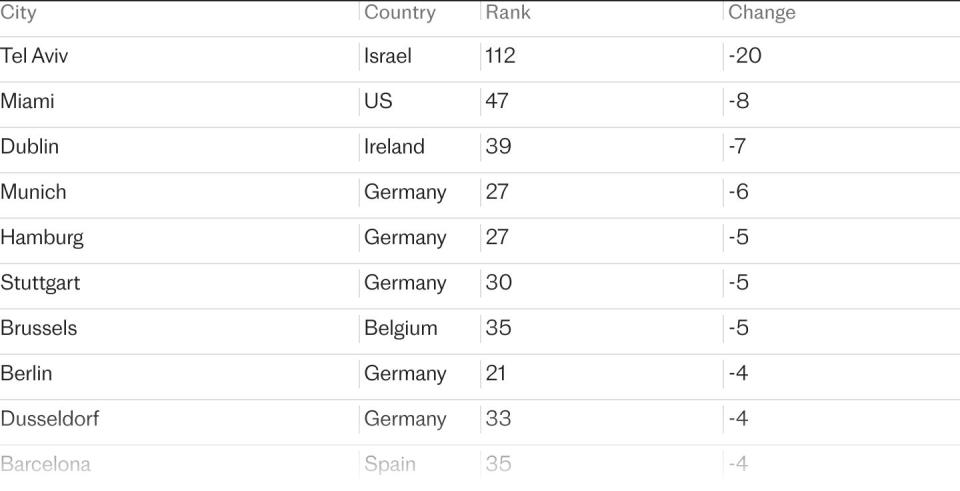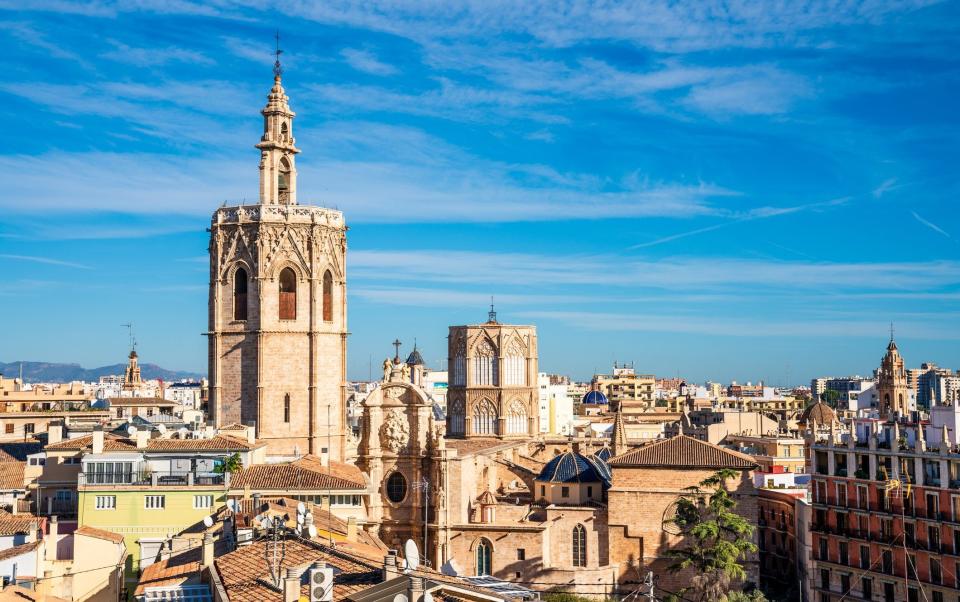The writing has long been on the wall for Airbnb investors in Spain. Now, they are feeling the backlash. In the two-week period, the cities of Palma, Malaga, Valencia and Barcelona have clamped down on short-term rentals (STRs), announcing strict restrictions.
The Spanish government has even said it is looking into a nationwide ban on tourist apartment rentals in residential buildings.
These drastic measures come against a backdrop of rising rents, growing visitor numbers and fierce protests against mass tourism.
There are now more than 400,000 STR properties in Spain, according to industry analyst AirDNA. But that is down from the 2019 peak of 419,946, says the firm’s Bram Gallagher.
“Unlike France, where the lists are constantly increasing, the restrictions have had an impact in the Spanish cities – as seen also in Portugal: the regulations make it more difficult [for property buyers] to protect the investment.”
Despite this, the number of international buyers in Spain in the first quarter of 2024 is close to record levels, according to the latest government figures. CaixaBank research has found that the average price gap between housing in tourist towns and other areas has widened to more than 75pc, an all-time high, in late 2023.
Such investors have resisted – and helped fuel – rising prices in Spanish cities. The cities with the highest concentration of STRs – including Madrid, Barcelona and Valencia – have recorded a rise in property prices in the year to date, according to Idealista, a real estate firm; in Malaga, prices have risen by 19.6pc in the past year.
Anti-tourism protests across Spain have been targeting unsustainable levels of mass tourism in cities and Airbnb allowing local housing prices to rise. This activism seems to have encouraged the city councils to make these announcements, although tourism levels are not solely to blame.
Back-ignition rental controls
Barcelona, Spain’s biggest recipient of international tourists, is leading the Airbnb crackdown.
A licensing system for Airbnbs was introduced in Barcelona back in 2011. By 2018, there were 18,000 listings, according to AirDNA, when stricter enforcement of illegally listed STRs began, along with a moratorium on new licenses in central areas ( Ciutat Vella, Eixample, Gracia, and Poble-Sec).
In 2021, it became the first European city to ban private room rentals of 31 days or less, and the number of listings plunged.
Last week, Mayor Jaume Collboni announced that he will completely get rid of tourist apartments in the city by 2029. He said he would do this by not issuing new licenses and not renewing existing ones.
The government hopes this will bring more than 10,000 short-term leases back onto the residential market, reducing rental prices in the Catalan capital, which have risen by 68pc in the past decade, according to council data.
But supply constraints have pushed occupancy levels to record highs – an average of 75pc over the past two years – according to AirDNA, further encouraging investors (and lots of illegal rentals too).


Mark Stucklin, from Barcelona-based analyst Spanish Property Insight, says: “According to the town hall only 10,101 properties have rental licences. The practice of long-term rental tenants subdividing their apartments into tiny rooms for STR subletting is regularly reported in the local press. It’s very profitable, and landlords can’t evict them because they pay the rent.”
The Spanish government has also recently introduced new rent controls to protect vulnerable tenants. But these have backfired in cities across Spain, persuading many long-term letting landlords to turn to short- or medium-term rentals, making a shortage of rental properties even more acute. .
“The new rent controls make it nearly impossible to evict a tenant for non-payment and eliminate the landlord’s ability to negotiate rates, conditions and contracts,” says Stucklin.
Properties in Barcelona with an STR license are being sold at a 10-15pc premium, according to agent Lucas Fox, but with the potential ban looming – if the legislation is passed – this premium is certainly reduced.
Mohammad Butt, of Lucas Fox, says: “Some property buyers, who want to use a property themselves at some point, are turning to medium-term rentals. The advantage of long-term rentals is that a tenant is not locked in for five or seven years; medium term contracts are from two months to 11 months. There is great demand from digital rings.”
He says the potential net yield of 4.5pc is achievable – the key areas for these are the same as the STRs, such as the Quadrat d’Or of the Eixample district, and two-bedroom properties are more in demand than one-beds. -beds. types of rent.
‘Stop the avalanche’ of holiday leases
The increase in medium-term letting (known as seasonal or temporary letting) is also seen in the city of Valencia, where there are 9,490 STR listings, according to AirDNA.
These listed properties must have their own entrance, and entire buildings cannot be converted into STRs in the city’s old town or in the fashionable beachside area of Cabanal. But due to the lack of enforcement STRs can be increased by 15 pc from 2021.
In May, the Federation of Valencian Residents called for a moratorium on new tourist apartments to “stop the gentrification” of rental properties. The city council closed 160 unlicensed holiday rental flats, and last week approved plans to tackle tourist housing in the historic centre.


Valencia Property agent Graham Hunt says the city is full of ghuri prisons (known as “foreigner prisons”) – former shops and other ground-floor properties that have been converted into Airbnb lettings with security bars on the windows. They maintain their status as commercial businesses by avoiding ‘residential’ property rules.
“Most people are looking for a rental investment. They call and ask about Airbnb leases but they are 10 years too late. But everything is rented here, there is such a demand, whatever kind of rental you do,” he says.
It offers net yields at 5pc to 9pc for medium-term leases, popular with digital nomads, students and house hunters. For three-month rentals, the usual rate is €70 to €80 per night for a two-bedroom apartment costing €200,000 or €250,000 between the center and the sea.
He says a lack of long-term rentals – for the same reasons as Barcelona – has pushed up rates, so rents are out of line with average local wages.
‘Investors need to change their minds’
The lack of long-term rentals is an acute problem in the city of Malaga, where there are 7,282 STR listings, up 18.5 pc since 2012. It is still possible to buy apartments that come with STR licenses, but the city council announced last week that new licenses there. they will only be issued to properties with their own front door – leaving most flats unavailable.
“Investors have to change their mindset,” says Jose Félix Pérez-Peña Garrido, of Savills, who says that buyers are buying apartments and turning them over after a year, sometimes making a profit of €100,000. It’s no wonder property prices are rising.
“One possibility is medium-term letting,” he says. “A lot of buyers think they want [to invest in a] long term rental until they hear about the new regulations. Airbnb is being blamed for the inability of locals to rent affordable apartments, but that is only part of the housing problem.”
In Madrid – where STR apartments must have separate entrances – some buyers are taking advantage of an embryonic luxury rental sector, says Knight Frank’s Ana White.
“There is such demand from students in the city’s business schools and their families. Some are trying before they buy.” These apartments cost around €1m.
With a moratorium on STR licenses also in the Balearic Islands, Airbnb investment buyers must look to new areas where there is a shortage of tourist accommodation, says Bram Gallagher. It points to Vigo, Almeria and Pamplona, the three fastest growing areas for Airbnb listings – up to over 57 a year from 2021.
In Vigo, in the increasingly fashionable Galicia, the average price of a two-bedroom apartment is €268,000, according to Kyero.com.
“I don’t think we’ve reached peak Airbnb in Spain – we just need to spread it to other areas. Limiting Airbnb is politically expedient, but it doesn’t reduce house prices.” It also increases hotel prices, as seen in New York, he says. Strict regulations in the city have seen STR listings fall by 82 a year from August 2023. “It affects accommodation options and affordability for tourists.”